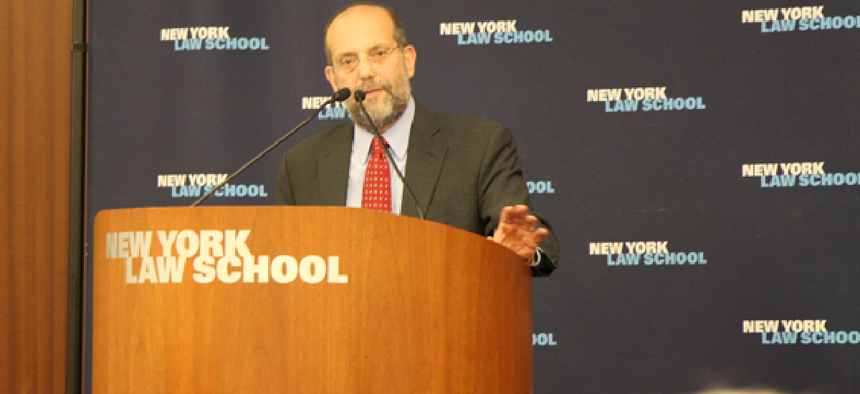Banks teases reforms, defends handling of homelessness crisis

The city will soon reassess its public assistance program and apply a “borough-based” approach to locate homeless New Yorkers closer to their former residences, Human Resources Commissioner Steven Banks said Dec. 16.
Banks, the highest-profile official directly responsible for responding to the homelessness crisis, teased some of these reforms during remarks at the New York Law School, and said more details would be forthcoming over the next few months.
Most significantly, the de Blasio administration will replace the Work Experience Program, which ties public assistance to acquiring a job, with one targeted to obtaining more stable jobs with a career trajectory.
“For example, people were assigned to do certain tasks in city agencies that didn’t lead to employment,” he said, adding that he might add job training programs at the Department of Sanitation, Department of Citywide Administrative Services, and the NYPD. “We’re putting new education and training programs in place to help people get the kind of skills they need to develop a career pathway and get off public assistance.”
In response to the record number of homeless - 60,600 individuals were sleeping in shelters as of this week - the city has faced immense pressure to curb the crisis. It has increased street outreach, fixed violations at some shelters, gotten lawyers to defend tenants from eviction, is expanding supportive and affordable housing units, and restored a rent subsidy aimed at keeping residents in their apartments.
But the crisis gained even more urgency following a radiator explosion in the Bronx which killed two children at an apartment used to house displaced residents. Since January, the city has eliminated 450 of these cluster units - some 3,600 privately owned apartments rented by the city. Banks prioritized closing units with “some of the worst conditions and the least amount of services,” he told reporters after his remarks.
Banks is well aware of how sensitive communities can be to locating shelters in their neighborhoods; residents of Maspeth, Queens, protested directly in front of his Brooklyn home to protest a shelter proposed for their neighborhood. But the approach seeks an equitable distribution of shelter sites.
“We’re moving to a borough-based approach where we can keep families and individuals close to employment, close to schools, close to medical care, and that’s a change,” he said. “Because historically that wasn’t always the criteria that was used for sitings. You ended up with the cluster program with 70 percent of them being located in the Bronx, because that’s where the rentals were.”
Banks has steered much of the city’s response to the crisis, particularly after de Blasio last year tapped him to lead a review of the Department of Homeless Services following the resignation of then-Commissioner Gilbert Taylor.
Banks has sometimes butted heads with other government officials, most notably Governor Cuomo, over the response to homelessness. A report issued just this week by City Comptroller Scott Stringer, once again called on the city to release a roadmap to deal with the homelessness crisis and showed the city was spending up to $629 per night for hotel rooms.
During a question-and-answer session, an audience member asked “to what extent do you think that political figures operating on a state level are contributing to public perception of the homelessness crisis and your performance?” Banks delayed his response and took a dramatic sip of water, garnering a laugh from the room, before diplomatically stating he was more concerned about present problems which he said are the result of issues that have developed over many years.
“The things we can control, we’re very focused on trying to control them,” he said.
During his remarks, Banks detailed his biography as a lawyer and former head of the Legal Aid Society – where he often sued the agencies he now leads. Also in attendance at the event which invites prominent figures to speak before an audience of lawyers, students and advocates was former Public Advocate Betsy Gotbaum, and former Mayor David Dinkins who in short comments from his table said HRA has a “good guy in charge.”
“I used to call him my favorite lawyer who sued me,” Dinkins said.
